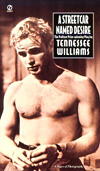
A Streetcar Named Desire
By Tennessee Williams
Of all of Tennessee Williams's characters, those in Streetcar move me the most. I first read the play in high school while looking for monologues to perform at theater contests. Many years later, I studied with the great director José Quintero, who pointed out that when Stanley enters, he tosses his wife, Stella, a bloody package of meat. Right away that's Williams telling you theirs is a primitive relationship. Blanche, on the other hand, uses illusion to escape the realities of aging and death—"the long parade to the graveyard!" She says, "I don't want realism. I want magic!" My favorite line is in the scene in which Mitch embraces and kisses her. Blanche looks at him and says, "Sometimes—there's God—so quickly!" She believes she will be saved at last.
By Tennessee Williams
Of all of Tennessee Williams's characters, those in Streetcar move me the most. I first read the play in high school while looking for monologues to perform at theater contests. Many years later, I studied with the great director José Quintero, who pointed out that when Stanley enters, he tosses his wife, Stella, a bloody package of meat. Right away that's Williams telling you theirs is a primitive relationship. Blanche, on the other hand, uses illusion to escape the realities of aging and death—"the long parade to the graveyard!" She says, "I don't want realism. I want magic!" My favorite line is in the scene in which Mitch embraces and kisses her. Blanche looks at him and says, "Sometimes—there's God—so quickly!" She believes she will be saved at last.
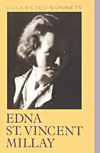
Collected Sonnets of Edna St. Vincent Millay
By Edna St. Vincent Millay
I love the sonnet form, and I find that some of Millay's poems echo my life in a way that brings me comfort time and again. So many of her sonnets capture that profound feeling of lost love—one haunting sextet is:
There are a hundred places where I fear
To go, —so with his memory they brim.
And entering with relief some quiet place
Where never fell his foot or shone his face
I say, "There is no memory of him here!"
And so stand stricken, so remembering him.
By Edna St. Vincent Millay
I love the sonnet form, and I find that some of Millay's poems echo my life in a way that brings me comfort time and again. So many of her sonnets capture that profound feeling of lost love—one haunting sextet is:
There are a hundred places where I fear
To go, —so with his memory they brim.
And entering with relief some quiet place
Where never fell his foot or shone his face
I say, "There is no memory of him here!"
And so stand stricken, so remembering him.
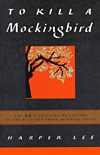
To Kill a Mockingbird
By Harper Lee
This is my favorite book. I've read it many times, often aloud. I find the rhythm of the language soothing, perhaps because, like Harper Lee, I'm a southerner. It is the quintessential coming-of-age story, set in a small southern town, in which racial injustice is seen through the clear eyes of a child. But it is also about the prejudices and preconceptions we all have of those who are different from ourselves. The story of Boo Radley, of course, is the most poignant example of this. I also love the part where a rabid dog wanders down the street one afternoon, and Calpurnia, the housekeeper, calls Atticus home. His son, Jem, who's having a hard time looking up to his father, is surprised to see Sheriff Tate offer Atticus the rifle—and astonished when Atticus hits the dog squarely between the eyes.
By Harper Lee
This is my favorite book. I've read it many times, often aloud. I find the rhythm of the language soothing, perhaps because, like Harper Lee, I'm a southerner. It is the quintessential coming-of-age story, set in a small southern town, in which racial injustice is seen through the clear eyes of a child. But it is also about the prejudices and preconceptions we all have of those who are different from ourselves. The story of Boo Radley, of course, is the most poignant example of this. I also love the part where a rabid dog wanders down the street one afternoon, and Calpurnia, the housekeeper, calls Atticus home. His son, Jem, who's having a hard time looking up to his father, is surprised to see Sheriff Tate offer Atticus the rifle—and astonished when Atticus hits the dog squarely between the eyes.
Impunity Jane
By Rumer Godden
In this children's story, a little doll is bought and taken home to sit on a pincushion in a dollhouse. She calls herself Impunity, which means, "escaping without hurt." She sits in the dollhouse for 50 years, longing to live in a pocket and see the world. When finally a 7-year-old boy named Gideon reaches into the dollhouse and steals her, she has all kinds of adventures. "I'm Imp-imp-impunity Jane!" she cries. As I was growing up and feminism was spreading throughout America, I often thought of Impunity Jane. Like her, I wanted the whole world to be open to me—I didn't want to live like a doll in a dollhouse.
By Rumer Godden
In this children's story, a little doll is bought and taken home to sit on a pincushion in a dollhouse. She calls herself Impunity, which means, "escaping without hurt." She sits in the dollhouse for 50 years, longing to live in a pocket and see the world. When finally a 7-year-old boy named Gideon reaches into the dollhouse and steals her, she has all kinds of adventures. "I'm Imp-imp-impunity Jane!" she cries. As I was growing up and feminism was spreading throughout America, I often thought of Impunity Jane. Like her, I wanted the whole world to be open to me—I didn't want to live like a doll in a dollhouse.
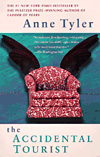
The Accidental Tourist
By Anne Tyler
The reason I love this book is the line "He began to think that who you are when you're with somebody may matter more than whether you love her." The tragedy of losing his son breaks open Macon Leary's marriage; he and his wife cannot heal each other. When he meets Muriel Pritchett, he becomes a different man. With her, he's finally able to grieve for his dead son. That one line returns to me again and again. It allows for the mysterious alchemy between people—those times when for no earthly reason you are attracted to someone. In their presence, you blossom into the person you were meant to be.
By Anne Tyler
The reason I love this book is the line "He began to think that who you are when you're with somebody may matter more than whether you love her." The tragedy of losing his son breaks open Macon Leary's marriage; he and his wife cannot heal each other. When he meets Muriel Pritchett, he becomes a different man. With her, he's finally able to grieve for his dead son. That one line returns to me again and again. It allows for the mysterious alchemy between people—those times when for no earthly reason you are attracted to someone. In their presence, you blossom into the person you were meant to be.
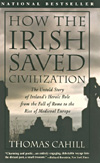
How the Irish Saved Civilization
By Thomas Cahill
I was attracted to this book because my middle name is Doyle, and if my Irish ancestors saved civilization, I wanted to learn about it! Cahill tells the story of this little-known "hinge" of history in a scholarly and entertaining way. In the fifth century, as the Roman Empire fell to the barbarian hordes, Saint Patrick was bringing Christianity to Ireland. Irish monks spent generations recording their own ancient stories as well as copying Greco-Roman literature. Then they brought that learning back to Europe, as they founded monasteries in places that became the great university cities of Medieval Europe.
By Thomas Cahill
I was attracted to this book because my middle name is Doyle, and if my Irish ancestors saved civilization, I wanted to learn about it! Cahill tells the story of this little-known "hinge" of history in a scholarly and entertaining way. In the fifth century, as the Roman Empire fell to the barbarian hordes, Saint Patrick was bringing Christianity to Ireland. Irish monks spent generations recording their own ancient stories as well as copying Greco-Roman literature. Then they brought that learning back to Europe, as they founded monasteries in places that became the great university cities of Medieval Europe.




